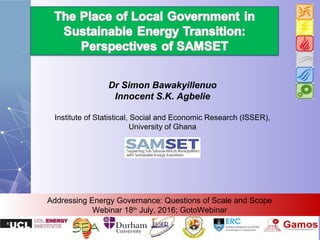
Webinar 5 | Jul-16 | The Place of Local Government in Sustainable Energy Transition: Perspectives of SAMSET
- 1. Dr Simon Bawakyillenuo Innocent S.K. Agbelie Institute of Statistical, Social and Economic Research (ISSER), University of Ghana Addressing Energy Governance: Questions of Scale and Scope Webinar 18th July, 2016; GotoWebinar
- 2. Prevailing urbanization Trends in Africa and implications 2 “70 per cent of all African urban population growth will be in smaller cities and those with populations of less than half a million. This is where the real urban transition of Africa is taking place.” (UN-HABITAT 2010) …as long as cities and local authorities are not put in a position to take initiatives and be at the forefront of actions to make African cities more inclusive, competitive, sustainable, safer and better managed, there is little chance that Africa will overcome the challenges posed by rapid urbanization. (Cities Alliance, 2013:10) Population: Urban settlements over 50,000 (Year 2000)
- 3. Mandates of local authorities and existing capacity vis-à-vis energy governance • African cities are faced with rapid urban population growth, increasing energy demand pressures in the face of lagging energy infrastructure. • Most local governments’ mandates are relevant to a more sustainable energy development, but lack explicitness in the midst of technical capacity challenges to implement sustainable energy initiatives. • Challenges with energy governance at the local level in Ghana – Lack of full operationalisation of the decentralisation system in Ghana – Municipal authorities’ limited mandates on energy infrastructure development and supply – Frequent movement of personnel by central authority – Traditional land ownership and distribution patterns • Disruption of municipal layouts and planning – Paucity of energy data at the local level Structure of the District Assembly DISTRICT ASSEMBLY Public Relations & Complaints Committee Executive Committee Social Services Sub-Comm Works Sub-Comm Financial & Admin. Sub-Comm Justice & Security Sub-Comm Dev’t Planning Sub-Comm
- 4. Mandates and level of local gov’t control in Ghana Energy-related mandate Activities Level of Local government control Housing and town planning Building control Medium (by-laws) Government housing delivery Non-existence Transport and spatial planning Town planning High Public transport services Low (National) Private vehicle (licensing, monitoring) Medium (Shared) Bus and taxi ranks High Urban roads, cycle and pedestrian walkway Low (National) Public facilities Street and traffic lighting Medium (Shared) Municipal and other public buildings High Utilities/services Electricity production and distribution Non-existence Decentralised RE generation Low (National) Petroleum product supply Non-existence Water supply services Medium (Shared) Refuse collection High Environment and public sanitation Environmental protection Medium (Shared) Economic development Local economic development / trade & industry High
- 7. SAMSET Project’s Entry Point Local government is an essential player in the energy transition process and, needs capacity enhancement to play its roles effectively. Local government is an essential player in the energy transition process and, needs capacity enhancement to play its roles effectively.
- 8. SAMSET… SAMSET Objectives: •Promoting the implementation of the Municipality’s sustainable energy and climate resilience work •Learning how best to support sustainable urban energy transitions in fast-urbanising Sub-Saharan Africa, and disseminating information on this SAMSET Activities: –Provision of training and capacity building –Provision of support, including planning, strategy and specific technical support –Sharing lessons between municipalities –Profile the achievements of the Municipality nationally, Africa-wide, and internationally –Developing an improved Knowledge Exchange Framework
- 9. SAMSET Project implementation Approach • Data collection exercise in Uganda (Kasese and Jinja) and South Africa (Cape Town and Polokwane) – SoE, Modelling and Futures reports produced – Sustainable Strategy building commenced Urban Areas: Sustainable Energy Transition Support State of Energy LEAP Modelling Sustain. Energy Strategy Develop strategy Energy futures reports Knowledge Exchange Framework Capacity Building Network meetings workshop Masters course All SAMSET countries involved
- 10. Key Emerging Issues from SAMSET-Ghana implementation • Capacity Development in Munics:Capacity Development in Munics: • Continuing Professional Development (CPD) Course • Network meetings held in SAMSET countries • Conference attendance and networking • In-country activities • Engagements in data collection processes • Mini workshops • Energy Development Initiatives:Energy Development Initiatives: • Energy Data at local level: SoE reports for ASEM and GEM • Energy strategies in MTDPs of munics • Writing of proposals to attract energy dev’t grants • Implementation of ‘low-hanging’ projects eg sensitization underway in munics • Knowledge Exchange:Knowledge Exchange: • Data collection processes and collaboration with munic officials • Stakeholder engagements • Municipality engagements • Data validation workshops • Learning from other SAMSET partners from other countries
Editor's Notes
- The three big areas of intervention required to change the city’s carbon profile to a robust one are (1) electricity efficiency (2) transport efficiency and (3) renewable electricity supply. A focus on all three, and ambitious implementation within each, is necessary to change the profile. We are calling the robust profile the Optimum Energy Future, and it includes many sub interventions in each sector, all of which are do-able (although ambitious)
